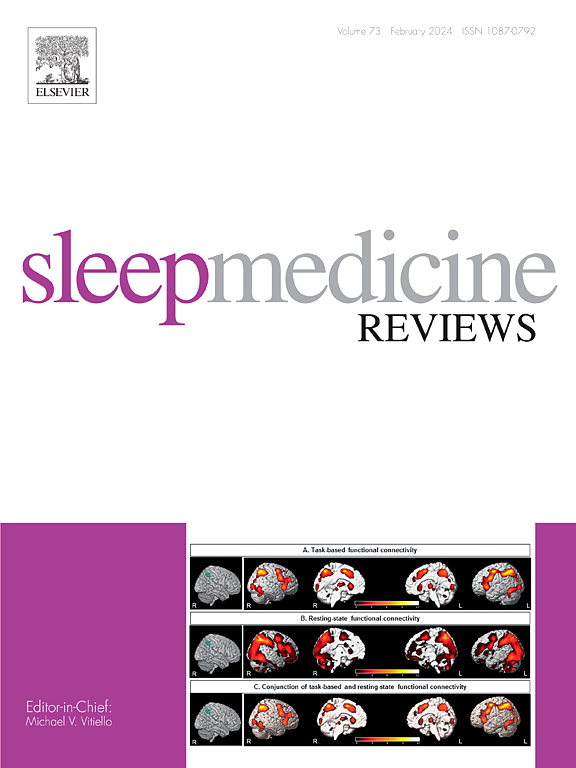The association between sleep quality and telomere attrition: A systematic review and meta-analysis comprising 400,212 participants
IF 9.7
1区 医学
Q1 CLINICAL NEUROLOGY
引用次数: 0
Abstract
Psychosocial stressors accelerate telomere attrition, a biomarker of cell aging, whereas good sleep is hypothesized to be a mitigating factor. However, methodological aspects - particularly underpowered studies, inconsistent findings, and multiple approaches to assessing sleep – demonstrate the need for a meta-analysis. After PROSPERO registration, we conducted a systematical search of the following databases until June 2024 to identify studies examining the relationship between sleep quality and telomere length in adult humans: CINAHL, Cochrane Library, MEDLINE, PsychINFO, PubMed, Web of Science, and Google Scholar. In total, 29 studies met inclusion criteria for the systematic review according to the preferred reporting items for systematic reviews and meta-analysis guidelines (PRISMA), 19 of which provided data that was appropriate for meta-analytic calculations. We identified the Pittsburgh sleep quality index (PSQI) global score (odds ratio (OR) 1.24, CI 95 % [1.03; 1.50], p = 0.02), sleep-related daytime impairments (OR 1.01 [1.00; 1.02], p = 0.04), and wake after sleep onset (WASO) time (OR 1.28 [1.12; 1.47], p < 0.01) as to be significantly associated with telomere attrition. Thus, the subtle telomere attrition-mitigating role of sleep has been demonstrated based on a sufficiently large body of data and defined aspects of sleep quality.
睡眠质量与端粒磨损之间的关系:一项包含400,212名参与者的系统综述和荟萃分析
社会心理压力会加速端粒损耗,这是细胞衰老的一种生物标志物,而良好的睡眠被认为是一种缓解因素。然而,方法学方面——尤其是研究力度不足、发现不一致以及评估睡眠的多种方法——证明了荟萃分析的必要性。在PROSPERO注册后,我们对以下数据库进行了系统的搜索,直到2024年6月,以确定检查成年人睡眠质量和端端长度之间关系的研究:CINAHL, Cochrane Library, MEDLINE, PsychINFO, PubMed, Web of Science和谷歌Scholar。根据系统评价和荟萃分析指南(PRISMA)的首选报告项目,总共有29项研究符合系统评价的纳入标准,其中19项研究提供了适合荟萃分析计算的数据。我们确定了匹兹堡睡眠质量指数(PSQI)整体评分(比值比(OR) 1.24, CI 95% [1.03;1.50], p = 0.02),与睡眠相关的日间障碍(OR 1.01 [1.00;1.02], p = 0.04),睡眠后醒来(WASO)时间(OR 1.28 [1.12;[1.47], p <;0.01),与端粒磨损极显著相关。因此,基于足够大的数据体和睡眠质量的定义方面,睡眠对端粒磨损的微妙缓解作用已经得到了证明。
本文章由计算机程序翻译,如有差异,请以英文原文为准。
求助全文
约1分钟内获得全文
求助全文
来源期刊

Sleep Medicine Reviews
医学-临床神经学
CiteScore
20.10
自引率
3.80%
发文量
107
期刊介绍:
Sleep Medicine Reviews offers global coverage of sleep disorders, exploring their origins, diagnosis, treatment, and implications for related conditions at both individual and public health levels.
Articles comprehensively review clinical information from peer-reviewed journals across various disciplines in sleep medicine, encompassing pulmonology, psychiatry, psychology, physiology, otolaryngology, pediatrics, geriatrics, cardiology, dentistry, nursing, neurology, and general medicine.
The journal features narrative reviews, systematic reviews, and editorials addressing areas of controversy, debate, and future research within the field.
 求助内容:
求助内容: 应助结果提醒方式:
应助结果提醒方式:


